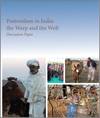Ce livre offre une perspective unique et une compréhension profonde d'un monde qui change rapidement, avec des contributions des praticiens et des académiciens. En dépit des contraintes et des idées préconçues, le pastoralisme continue à jouer un rôle substantiel dans le développement social et économique dans la région Afrique de l'Ouest comme ailleurs, et dans l'intégration régionale. Les caractéristiques innées de la mobilité et de l'adaptabilité signifient que le pastoralisme demeurera crucial pour les moyens de subsistance résilients. Ce livre présente des zones de production et de consommation établies et nouvelles, et démontre l'évolution rapide des chaînes de valeur pastorale.
Year of publication: 2016Organization: Netherlands Development Organisation (SNV), KIT Royal Tropical Institute
Topic: Economy, Value addition
Language: Français
Type of document: Technical
Geographical coverage: West Africa
Pastoralism is a practice that makes the best use of natural resources in the context of sustainability, availability, and environmental limitations, while producing wealth for the herder families as well as for the nation. This photo feature traces the lifestyle of some of these nomadic herders and shows the hardships they face with a shrinking of their resource base. It serves as a soft advocacy tool and calls for a benevolent state to protect the interests of the pastoralists.
Year of publication: 2016Organization: Individual authors
Topic: Economy, Gender and youth, Indigenous knowledge, Indigenous peoples, Organization, Participation, Social services
Language: English
Type of document: Technical
Geographical coverage: South Asia
Pastoralists are believed to form 7% of India’s population, i.e., about 88 million people, inhabiting mainly the arid and semi-arid areas of the country. Pastoralism – an old dynamic production system prevalent throughout the world – is economically productive and ecologically sustainable, and uses variability in a positive way. Yet, pastoralism does not get the recognition it deserves. This paper discusses the benefits and challenges of pastoralism and gives ten recommendations how to strengthen pastoralism in India.
Year of publication: 2016Organization: Individual authors
Topic: Economy, Land, Participation, Social services
Language: English
Type of document: Technical
Geographical coverage: South Asia
En la actualidad, en el medio rural de América Latina, la existencia o prevalencia de las sociedades pastorales no es tan evidente, ya que la agricultura familiar campesina se encuentra en el contexto del cual la relación entre las comunidades y su cría es condición esencial para su sostenibilidad. Contribuyendo a la conservación de la biodiversidad del ecosistema, especialmente de los pastos, y como un recurso esencial para la vida y la producción como fuente de proteínas para alimentos y fibra para uso textil, tanto en la industria como en la industria. Este número de Leisa destaca la importancia de los pastores.
Year of publication: 2016Organization: Individual authors
Topic: Climate change, Economy, Environmental services, Indigenous knowledge, Innovation, Organization, Value addition
Language: Español
Type of document: Newletters
Geographical coverage: Latin America
In the Sahel, around 65% of the active population works in the agriculture sector and their livelihoods are therefore affected by climate change, markets and environmental factors.
To address these recurrent crises, analytical tools to assess the situation and identify vulnerable
populations have been set in place in the region and refined in recent years. In addition, innovative practices have been developed, to support risk reduction, climate change adaptation, the fight against malnutrition and social protection.
This booklet presents 11 good practices organized around 5 themes, including livestock, with a particular focus on pastoralism.
Year of publication: 2016Organization: Food and Agriculture Organization of the United Nations (FAO)
Topic: Climate change, Environmental services, Food security, Gender and youth, Participation, Resilience
Language: English
Type of document: Technical
Geographical coverage: West Africa
Millions of people worldwide, including pastoralists, depend on the commons for their livelihood, cultural identity and wellbeing. Secure tenure rights to commons can provide incentives for the environmentally sustainable use of natural resources and for responsible investments in the productivity of the resource systems. This guideline proposes strategies to secure legitimate tenure rights to commons including strategies for legal recognition and protection, strategies for implementation by states and rights holders, and, finally, the strategies to support the enjoyment of rights. It also includes seven illustrative cases of practice from around the world, and methodological steps for national and local adaptation.
Year of publication: 2016Organization: Food and Agriculture Organization of the United Nations (FAO)
Topic: Food security, Indigenous peoples, Land, Participation
Language: English, Français, Español
Type of document: Technical
Geographical coverage: Global
A case study highlighting how the Oldokhiin Devjikh pastoralist community in Khuld soum (town) of Dundgobi is surviving under challenging climate conditions. In this part of the Gobi Desert, their initiatives involves building relationships between herding livestock in a traditional way and planting trees to cope with sand movement and land degradation and putting efforts into spring water conservation. This community is a member of Mongolian Alliance of Nomadic Indigenous Peoples (MANIP), which is a national network coordinated by pastoralist leaders supported by FAO`s Pastoralist Knowledge Hub programme.
Year of publication: 2016Organization: Food and Agriculture Organization of the United Nations (FAO)
Topic: Climate change, Resilience
Language: English
Type of document: Technical
Geographical coverage: Central Asia
Modern dairy plants buy fresh milk from local farmers and herders to make into many different products. The company pays a fair price, but requires strict hygiene: they only buy milk that is clean and fresh.
Year of publication: 2016Organization: Individual authors
Topic: Economy, Value addition
Language: English, Français, Hausa, Yorùbá
Type of document: Videos
Geographical coverage: West Africa









